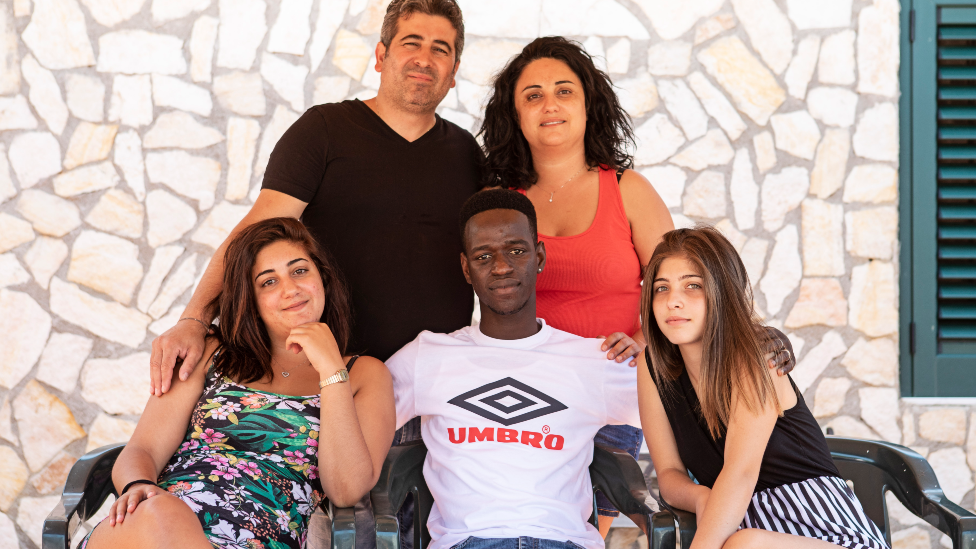Italian family fosters Gambian migrant: ‘The son we never had’

image copyrightKate Stanworth
In our series of letters from African journalists, Ismail Einashe meets a Gambian migrant who was fostered by an Italian family as a teen.
They had all been living with his grandmother in the northern town of Basse, where life was a struggle.
Five-and-a-half years later, the young migrant – who prefers to go by his childhood nickname of Lexy – lives on the Italian island of Sicily, where he is fluent in Italian and has been fostered by a local family.
His Italian foster parents say he is the son they had always hoped for but never had.
In fact, it was his two foster sisters who badgered their parents to foster him after admiring his dance moves at a reception camp where he had ended up after being rescued by Italian lifeguards on the Mediterranean in August 2015 following a traumatic and arduous nine-month journey from The Gambia.
It was a camp for migrant minors in Agrigento, which was run by his parents-to-be, Antonio and Giusella Ferraro.
He was fostered through a process in Italy known as “affidemento” whereby a child is placed in the family or home of a government-certified caregiver or foster parent.
Lexy’s story is not unique, some Italians in recent years have used this process to formally foster some of the thousands of unaccompanied minors arriving from countries such as Nigeria, Mali, The Gambia and Senegal.
Sharing a love of football and cooking
I’d been in touch with him for a while through a mutual friend and had been intrigued to see his stream of positive social media posts about his new family – sharing photos like that of him and his foster father beaming as they proudly wore Barcelona FC T-shirts to cheer on their favourite player Lionel Messi.
So on a trip to Sicily I wanted to see for myself this young African migrant whose life was so different from the often tragic stories of others who make the dangerous journey to Europe.
On a blistering summer morning I arrived at the Ferraros’ summer beach house in the village of San Leone.
Over several days of eating mountains of pasta, sunbathing and seeing the family relax on holiday, I could see the love felt for Lexy and how much his presence had changed them.
Giusella, who is fiercely proud of how well he has integrated into Sicilian society, including his mastery of the Italian Favara dialect, loves cooking him his favourite pasta dish – al forno with courgettes, eggs, carrots and parmesan.
But she says his Gambian roots have also altered her kitchen spice cupboard, which now has ingredients foreign to most Italian kitchens. She shows me jars of cumin, chilis, coriander, peppers and even Jumbo, the seasoning powder popular in West Africa.
Ramadan meals
Lexy says his new family respects his Islamic faith, they celebrate the Muslim festival of Eid with him.
Even during the fasting month of Ramadan, his mother gets up at around three in the morning to cook him sahari, the pre-dawn meal.
And out of respect, they no longer serve pork in the house – and Giusella also serves his food on different plates and glasses because he does not drink alcohol.
You may also be interested in:
He is now able to send back money occasionally to help his Gambian family – and hopes this will stop them from following in his footsteps.
Plans to visit The Gambia
A small dingy weighed down with terrified, vomiting people for hours in the middle of an expanse of rough water.
“You could give me $1m and I would not do it again,” he told me.
His foster family would like to visit The Gambia with him and his father Antonio has plans to help him build a house there one day.
Lexy worked with Antonio for a couple years at the migrant camp, but has now struck out on his own.
He works at a pharmacy in Favara – a job he loves. He has no plans to head to northern Europe – the aspiration of many an African migrant.
Instead he says his future is with his new family and friends in Sicily – in keeping the island’s centuries-old tradition of being a crossroads of cultures.
More Letters from Africa:
